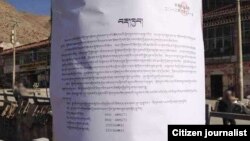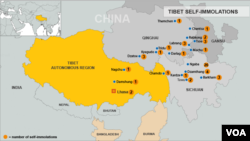Posters are going up in parts of China warning ethnic Tibetans against setting themselves on fire in protest and offering money in exchange for information.
The posters say police will pay $8,000 to anyone who provides information "on the people who plan, incite to carry out, control and lure people to commit self-immolation." The announcement promises a reward of about $30,000 to anyone who gives creditable information about the region's four most recent self-immolations.
Authorities, the posters indicate, will keep secret the names of any informants and "be responsible for their security."
According to a full translation by the International Campaign for Tibet, the notices also decry self-immolation as "an extreme action against human beings, against society" and warns would-be protesters such actions "are ungrateful of how your parents raised you."
China has long-accused Tibetan exiles of self-immolating as part of a separatist struggle, denouncing them as terrorists.
Chinese Foreign Ministry spokesman Hong Lei again accused the Dalai Lama of inciting the deadly protests on Wednesday, saying it "is despicable and deserves the people's condemnation."
The Dalai Lama and the Tibetan government-in-exile say they oppose all violence. According to Britain's The Guardian, Tibet's "government in exile" has recently issued a formal call to end self-immolations.
A recent spate of self-immolations
At least three Tibetans have set themselves on fire to protest Chinese policies in the past five days, and six Tibetans have died in self-immolation protests this month.
On Tuesday, an older Tibetan man has set himself ablaze outside the military headquarters in Labrang, not far from the highly respected Labrang Monastery in Gannan Tibetan Autonomous Prefecture. His self-immolation came just one day after a 61-year-old farmer set himself on fire near the same monastery, which, located in China's northwestern Gansu province, was the scene of deadly protests against Chinese rule in 2008.
On Sept. 26, Gary Locke, U.S. State Department ambassador to China, visited two monasteries in Aba Prefecture of Sichuan Province, which has seen 26 of self-immolations since 2009.
At a U.S. State Department briefing Wednesday in Washington, spokeswoman Victoria Nuland said she was not aware of the reward offer but expressed concern about the escalating tensions.
"We have consistently expressed our concern about the violence in the Tibetan areas, about the continuing pattern of self-immolations, heightened tensions in Tibet in general," she said. "We continue to both publicly and privately urge the Chinese government at all levels to address the underlying policies in Tibet that have created these tensions and which threaten the cultural heritage of the region."
Robert Barnett, director of the Modern Tibetan Studies Program at Columbia University in New York, says the immolations are worrisome.
"It does suggest that boiling point could be reached as all these things come together," he said, adding that it is difficult to determine the significance of the reward money. "If [Chinese officials] are moving to a stage where they think that the exiles are planning [the self-immolations] rather than just encouraging them, that would be a new development."
Barnett says there appears to be an element of fear about how the powerfully symbolic protests are spreading.
"I think [the pattern of self-immolations] is conceived as dangerous by the authorities," he said. "The fact that this movement is spreading further to the east, closer to the Chinese borders, into these populations where you have educated Tibetans — students, monks — who have a tradition of thinking for themselves, I think they may be concerned about this."
But the motivation to find and stop would-be protesters from setting themselves on fire, he cautions, may be genuinely humane. For all the brutality of the Chinese state, he said, officials honestly want to see an end to the tragic and horrifying suicides.
Since February of 2009, at least 58 Tibetans have set themselves on fire to protest Chinese policy in Tibet. In 48 cases, the protesters have died. And experts like Barnett note that the tone and tactics used by Chinese officials at a national level is not always reflected on the local level, where authorities tend to be more aggressive.
Such aggression has become increasingly visible. Earlier this month, Chinese police in Nagchu town arrested about 30 people, including the uncle, sister and brother in-law of a 43-year-old man who set himself on fire in protest.
Activists have also accused Chinese security forces of killing a man to prevent him from setting himself on fire and bringing attention to Tibet's plight.
- VOA State Department Correspondent Scott Stearns contributed to this report.













